#climate change cw
Text
I hate talking to boomers about being freaked out about the weather because they’re like ‘but at least you don’t have to shovel all that snow!’ while I’m having a panic attack about it being 50 degrees and raining in mid December in New England
#climate change cw#yes I would rather shovel the snow!#first off I like winter#second I hate the constant reminder our planets dying and there’s nothing I can do to stop it!!#like remember when we were kids and had to wear snowsuits on Halloween and now it’s warmer in December than it was half the summer
18 notes
·
View notes
Text
Thinking about how it's estimated over 65% of current insect species will go extinct in the next century and that 5-10% of insect species in the last 150~200 years have gone extinct......and as far as I know this isn't even counting animals that fit the same "bug" niche as insects but aren't insects.......man..........makes me so sad....
13 notes
·
View notes
Text
I’m caving, I’m engaging in leftist infighting behavior. However, I am putting it below the cut because 1. It’s not productive and 2. You don’t need to sink to the same lows as me. I’m also not including OPs handle because I don’t want to engage.
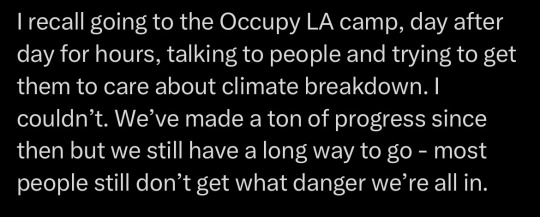
If I were to, let’s say, go to a protest about economic inequality where people are protesting how they can’t afford to feed their families, save for retirement or afford medical bills, and people were perhaps not receptive to me telling them that:
1. Climate change is happening and the current protest is a distraction for that
2. That they should cut carbon out of their lives like me, a highly paid academic who was able to build his own house in CA along with generational wealth
3. Get arrested regularly without the threat that I would lose said job that I need to provide for my family
I would maybe perhaps not chalk that up to people “not caring” but to the fact that I have completely ignored their base day to day survival concerns and instead pivot to incorporating a climate message into something that addresses those survival needs in the now as well as the future.
This is so stupid, Occupy was a messy movement as is and I’m sure in LA there were a lot of folks there who weren’t in dire straits who could make change but just GAH THE FRAMING
8 notes
·
View notes
Text
Climate change problems: according to repair guy, local hardware stores have completely run out of a bunch of common plumbing fixtures. It's been so long since it was sustainedly below freezing in the winter that no one was prepared for pipes bursting.
He wouldn't have had time to fix my upstairs window otherwise - he can't yet do the big-deal plumbing jobs he's been hired for. He was surprised that the store down the road even had weatherstripping in stock.
#thegeekgene: your cats' preferred window now correctly opens and closes#is at least partly sealed#and will have a screen as soon as i carry it up there#depressing cw#climate change cw
10 notes
·
View notes
Text
Currently facing, lbr, this is not normal, climate change related urban flooding. It is also made ten times worse due to govt's inability to fix any infrastructure issues for decades and instead they've made them worse so that they could make a little profit. idk how long it'll last since it's supposed to flood more in the coming days, idk how long we'll be unable to get out of the house. ¯_(ツ)_/¯
#personal#climate change cw#we also have no power rn and no idea when it'll come#we have some food and stuff so will probably be fine unless it goes on for several days#not all areas of the city are equal and the poorer neighbourhoods are much worse off and we need a lot of funds for them#this is fine.jpg
10 notes
·
View notes
Note
I’ve been really depressed lately and I think a lot of it is because between covid, global warming, politics, etc, along with me getting old (I’m already 24), it’s really hitting me that I won’t have any cool adventures like in previous lives. not even just being goofy kids with my friends. it’s all just gone. over. this is hands down the worst apocalypse ever..... and screw it since I’m laying everything out and this is anonymous, I’ll also be honest: I ‘missed out’ on all my adolescent/teen/college years to an ED that I still have, so this life really hasn’t ever had any moments worth remembering like in past ones. I wish I could go back to a canon where I had any fun at all— even ones that were mostly pretty scary had some people that made it worth it. this one just sucks and I’m all alone. I hope I’m not just making all of this kin stuff up and that reincarnation is real and I can have a new life in a different universe next time around
#fictionkinfessions#fictionkin#mental health issue#covid19 cw#climate change cw#politics cw#schools cw#disordered eating cw#mod party cat!
8 notes
·
View notes
Text
Every year the outlook for nonhuman species grows grimmer. In the case of marine-mammal species, the International Union for Conservation of Nature now classifies a third as endangered. A recent study by a team of European researchers concluded that even many of those species which seem to be doing all right, such as gray whales, are threatened by climate change. As Mustill himself observes, “To be alive and explore nature now is to read by the light of a library as it burns.”
A bit from The Strange and Secret Ways That Animals Perceive the World
#that last sentence sure fucking hit a bit too hard as someone trying to get into conservation#I have so much depression#climate change cw#mass extinction#ask to tag
6 notes
·
View notes
Text
I miss when December was cold
1 note
·
View note
Text
Something’s wrong.
It’s a nice day. Weather’s high sixties. A little cool in the shade, warm in the sun. Perfect. You’re going to go for a run later. Maybe skate. Hang out with friends. It’s a nice day.
When you were a kid, living south of where you are now there was a lamb born around this time of year that died. The ground was frozen when you buried it. You remember because it was a week before your birthday and thick with snow.
There’s no snow now. Just mud. It’s a nice day. It’s the middle of February.
Something’s wrong.
17K notes
·
View notes
Text
Since the 1960s, the world has seen a spike in the number of natural disasters, largely due to rising sea levels and an ever gradually increasing global surface temperature.
The good news? We’re getting better at helping each other when disasters strike.
According to a recent study from Our World In Data, the global toll from natural disasters has dramatically dropped in the last century.
“Low-frequency, high-impact events such as earthquakes and tsunamis are not preventable, but such high losses of human life are,” wrote lead authors Hannah Ritchie and Pablo Rosado.
To conduct their research, Ritchie and Rosado gathered data from all geophysical, meteorological, and climate-related disasters since 1900. That includes earthquakes, volcanic activity, landslides, drought, wildfires, severe storms, and mass floods.
In the early-to-mid 20th century, the average annual death toll from disasters was very high, often climbing to over a million.
For example, the study cites that in 1931, 2.7 million people died from the Yangtze–Huai River floods. In 1943, 1.9 million died from the Bangladeshi famine of 1943. Even low-frequency events had extreme death tolls.
“In recent decades we have seen a substantial decline in deaths,” Ritchie and Rosado observed. “Even in peak years with high-impact events, the death toll has not exceeded 500,000 since the mid-1960s.”
Why has the global death toll from disasters dropped?
There are a number of factors at play in the improvement of disaster aid, but the leading component is that human beings are getting better at predicting and preparing for natural disasters.
“We know from historical data that the world has seen a significant reduction in disaster deaths through earlier prediction, more resilient infrastructure, emergency preparedness, and response systems,” Ritchie and Rosado explained in their study.
On April 6, [2024],a 7.2 magnitude earthquake rocked the city of Hualien in Taiwan. Days later, as search and rescue continues, the death toll currently rests at 16.
Experts have praised Taiwan for their speedy response and recovery, and attributed the low death toll to the measures that Taiwan implemented after an earthquake of similar strength hit the city 25 years earlier. Sadly, on that day in 1999, 2,400 people died and 11,000 were injured.
In an interview with Al Jazeera, Wang Yu — assistant professor at National Taiwan University — said that event, known as the Chi-Chi earthquake, revolutionized the way Taiwan approached natural disasters.
“There were lots of lessons we learned, including the improvement of building codes, understanding earthquake warning signs, the development and implementation of earthquake early warning (EEW) systems and earthquake education,” said Wang.
Those same sensors and monitoring systems allowed authorities to create “shakemaps” during Hualien’s latest earthquake, which helped them direct rescue teams to the regions that were hit the hardest.
This, in conjunction with stronger building codes, regular earthquake drills, and public education campaigns, played a huge role in reducing the number of deaths from the event.
And Taiwan’s safeguards on April 6 are just one example of recent measures against disasters. Similar models in strengthening prediction, preparedness, and recovery time have been employed around the world when it comes to rescuing victims of floods, wildfires, tornados, and so on.
What else can we learn from this study?
When concluding the findings from their study, Ritchie and Rosado emphasized the importance of increasing safety measures for everyone.
Currently, there is still a divide between populations with high gross national income and populations living in extreme poverty.
Even low-income countries that infrequently have natural disasters have a much higher death rate because they are vulnerable to collapse, displacement, and disrepair.
“Those at low incomes are often the most vulnerable to disaster events; improving living standards, infrastructure, and response systems in these regions will be key to preventing deaths from natural disasters in the coming decades,” surmised Ritchie and Rosado.
“Overall development, poverty alleviation, and knowledge-sharing of how to increase resilience to natural disasters will therefore be key to reducing the toll of disasters in the decades to come."
-via GoodGoodGood, April 11, 2024
#good news#hope#climate change#hope posting#climate news#climate crisis#climate anxiety#climate emergency#natural disasters#disasters#earthquake#wildfire#hurricane#cw death#taiwan#tsunamis#building construction#climate action#climate hope
409 notes
·
View notes
Text
Due to concerns about shareholder profits, kingdom being actively ravaged by death-spewing hell dragon adamant that the death-spewing hell dragon is actually pretty harmless, and also that the death-spewing hell dragon has been dealt with and everything's fine now, and also that the death-spewing hell dragon doesn't exist.
#rpg#roleplaying game#fantasy#D&D#setting idea#CW climate change#CW Covid#are both unrelated to this#this is not a metaphor#it's just about a dragon
520 notes
·
View notes
Text
I have to go get a new phone tomorrow and it should be exciting but I’m feeling really guilty about it. Like. I need a phone, I’ve had my current one since 2017 and it is struggling, I also can’t keep having a phone number that doesn’t work in the country in which I reside because you need a phone to get a job, but my brain is being a little bitch and is just like ‘no actually you needing a new phone (and eventually a computer) is the cause of all climate change, it is all directly your fault, you should have made your tech last forever, what are you even doing’
🙃 please stop brain, please
#unnecessary dramatics#I really need to cut this out because really I do my best#and sitting and rotting in my house is not solving anything#climate change cw#and yes I’ve lived in the us since may and I haven’t had a phone#it works in emergencies
5 notes
·
View notes
Text
"Save the Bees" is not enough
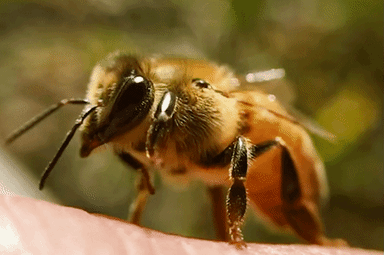
Yo, Solarpunks. Let us talk bees. And yes, everyone else, too. Like, yeah, bees.
See, whenever we are talking about insects dying, people will go "save the bees". And whenever I hear "save the bees", I will just go and say: "You don't get it, do you?"
People like bees. Because bees make honey, right? Yeah, only they don't. No, really. The honey bee is just one species of bees, while other bee species do in fact not make honey. Which is why we domesticated the honey bee, but not those other species. Duh. Because one was useful to us, while the others were not. As such we love the honey bee, but do not care about the other insects that are dying off.
Meme culture tells me, that you have probably seen Bee Movie. And I will now shock you. The movie lies to you! ("No!" - "YES!") And with that I do not mean, that actual bees are unable to speak. Or the fact that most bees are female (if we really wanna impose genders on bees). No, with that I mean the big thing that happens in the finale of the movie of all plants and what not dying off.
For those, who somehow have not seen that 90 minute meme: In the movie the honey bees sue the humans for stealing their honey. They win. Have their own honey and stop working. (Boy, lots to unpack there, eh?) and because of it all the flowers and crops die.
Well, here is the thing: Honey bees are actually not that important as polinators. Like, sure, they polinate a lot of crops and flowers, but... normally they are not the big pollinators, even though we kinda make them to, by shipping all those honey bees around. Other bee species pollinate a lot of plants, too. And so do other animals, like bats and birds for example. And that is without going into the less liked animals that pollinate, like flys. And then we also have all those self-pollinating crops and flowers, as well as air polinating plants.
Let me make one thing clear: You should care about bees. All the bees. (Because hint, the honey bees have the least of a problem.) But you should also care about the other insects that are dying off. Not only because of the pollination, but also because insects play a bigger role than just pollination.
Insects, for example, are important as prey animals for lots of birds and smaller animals. Just as some insects might actually play a role in dealing with natural waste. So, the dying off of insects is a bigger problem of "plants don't get pollinated".
So, why do the insects die?
Yes, part of the reason is habitat loss. You know, your lawn is a fucking desert to most insects. They not only need a bigger variety of plants around (not just flowers), but maybe also some old wood to borrow into and some loose earth on the ground. Stuff like that.
Insects usually also do not deal very well with the climate change. Be it with the growing heat or with the more erratic weather patterns of draught and then just quick and sudden rainfall, that does not linger.
And, of course, there is also the fact that we use a lot of anti-insect pesticides in agriculture. Which does not only hit those pests, but basically any other insect around.
And then... there is the invasive species. We kinda spread a lot of invasive insect species around, that also kill a ton of the local insect species.
So... What can you do? Well, if you have a garden, you can make it more insect friendly. Duh. You also can leave out some water for insects and birds. They all need it.
But most of all: Become politically active. Make sure that pesticides are used less. It is maybe the most important.
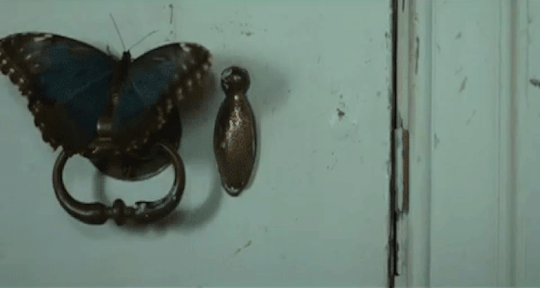
#solarpunk#save the bees#bees#cw insects#insects#climate change#conservation#save the planet#bee movie is lying to you#environmentalism
287 notes
·
View notes
Text
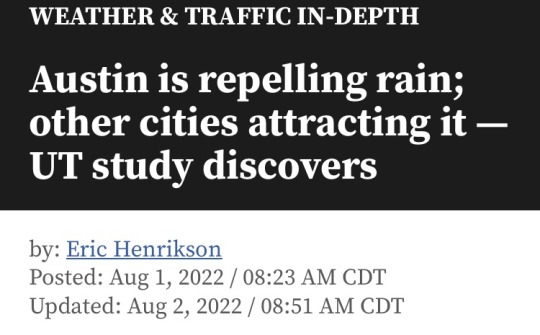
I understand this is a weather pattern thing but I’m obsessed with the concept of cities stealing rain from each other. New war crime unlocked.
#ok to rb#writing tag#writing prompt#cw: climate change#I don’t actually know if it is I haven’t read the article yet
1K notes
·
View notes
Text
Why We Need to Care About Insects
Originally posted on my website at https://rebeccalexa.com/why-we-need-to-care-about-insects/
Some months back a study was released that demonstrates just how damaging climate change is to insects, particularly those in tropical areas. Warming temperatures cause insects to die from overheating and dehydration, kills off their food sources, and lowers their fertility rates to dangerous levels. Moreover, changes in climate affect insect phenology, the timing of when they hatch, migrate, breed, and so forth.
And because insects are so small, they’re often disproportionately affected by many of these problems. As ectotherms, they rely on the air around them to regulate their body temperatures; their small mass means they lose heat faster than larger animals, and can be overloaded with heat much more quickly. Tropical insects are especially at risk from major fluctuations in temperature because they are adapted to a relatively narrow temperature range.
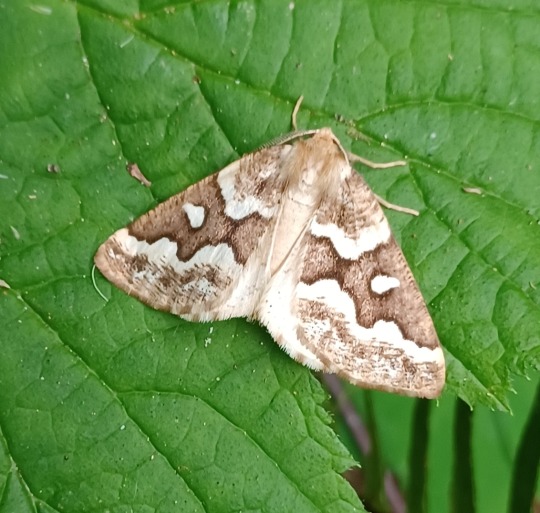
Gray spruce looper moth (Caripeta divisata)
But the problem goes far beyond the tropics, and we are in the middle of an insect apocalypse. This problem often flies under the radar of those who are not already aware of invertebrate conservation. While a few insects, such as monarch butterflies (Danaus plexippus) and domestic honey bees (Apis mellifera), find themselves in the press on a regular basis, most species don’t have large fan clubs. Some of my favorite insects include the white-tipped ctenucha moth (Ctenucha rubroscapus), the velvet snail-eating beetle (Scaphinotus velutinus), and the black-tailed bumblebee (Bombus melanopygus), none of which are insects you’re likely to find making the headlines.
To be fair, there are a lot of insect species out there, so it would be hard to feature every single one individually. But we already face the problem that many people simply just don’t see why we need to worry about fewer bugs around. Last year I wrote an article about how search engines tend to produce exterminator sites at the top of results for various insects, and while some of that is no doubt due to advertising-oriented algorithms, they do reflect a widespread demand for extermination services that isn’t matched by more positive attention to these little animals.
Much has been said among entomologists, ecologists, and other professionals about why we need to be concerned about the drastic drop in the numbers of many insect species, and I’ve written about it as well. I could reiterate what would happen if we lost our pollinators (and also how to save them!) or the crucial role insect detritivores play in reducing diseases and keeping the food web cycling along. And I am still a champion for mosquitoes and other unpopular insects.
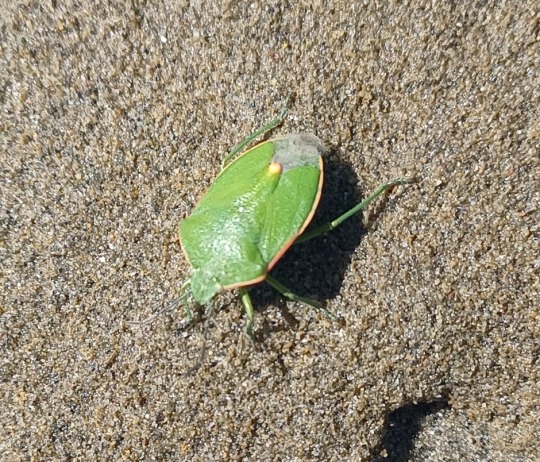
Green stink bug (Chinavia hilaris)
But these things always bear repeating. It may be that nine out of every ten organisms on this planet is an insect. Insects play an incredible number of ecological roles, from ecosystem engineers to pollinators to food sources and much more. Without them, ecosystems around the planet would collapse entirely.
I could certainly take the self-interested route and emphasize that fully one-third of our food relies on insects and other pollinators. I might also point out that insect detritivores help nourish the soil needed for everything from food crops to timber. While terrestrial insects and other arthropods only make up about a fifth of the amount of global biomass as their marine counterparts, they still represent a natural sink that holds about 200 million tons of carbon at any given time.
But our anthropocentric worldview rarely considers the intrinsic value of insects simply for existing. We’re constantly weighing and measuring their worth based on our biases and values. We divide them into “good” or “bad” insects: good insects are those that do things we like, like pollination or looking pretty, while bad insects are the ones that chew on our homes and plants or which bite or sting us when threatened or seeking food. For a lot of people, any insect beyond maybe a butterfly is a reason to say “Ewww, gross!” I’ve even seen this widespread among self-professed nature lovers, whether they have a true entemophobia or not, though there may be an evolutionary reason for this seemingly disproportionate reaction.
So consider this yet another attempt to change opinions about insects. I can’t cure entemophobia, but I can at least get people thinking more critically about personal and societal attitudes toward insects. I hope to get people to realize that widespread use of pesticides and other garden/agricultural chemicals–which has increased fifty-fold in twenty-five years–is driving the loss of so many insects. I’ve mentioned before that habitat loss is the single biggest cause of species endangerment and extinction, and that goes for insects, too. And, of course, the study mentioned at the start of this article is just one highlighting the increasing impact climate change has on insects worldwide.
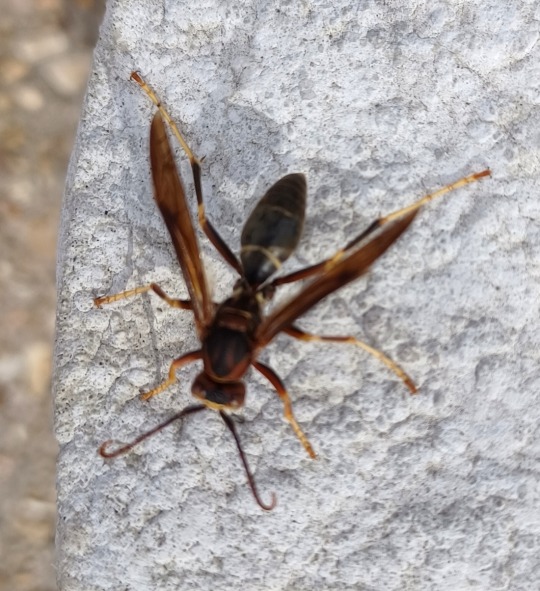
Metric Paper Wasp (Polistes metricus)
Let me wrap this up on a bright note: word is getting out. There is a lot more awareness than there was twenty years ago, and there’s more nuance than we had in the early “save the (domesticated European honey) bees” campaigns. More people are ditching pesticides and other garden chemicals unless absolutely needed, and regenerative agricultural practices that use fewer chemicals overall are gaining ground. And while numerous organizations are increasing awareness of insect conservation, the Xerces Society for Invertebrate Conservation–the oldest organization dedicated solely to invertebrates–is still going strong.
And you can help spread the word, too. Share this article with others, and some of the resources and organizations linked throughout. Consider your own relationship to the native insects in the world around you, and whether you might make their lives a little easier. And remember that sometimes it is the smallest of things that have the greatest importance in such a massive system as an entire living planet.
Did you enjoy this post? Consider taking one of my online foraging and natural history classes or hiring me for a guided nature tour, checking out my other articles, or picking up a paperback or ebook I’ve written! You can even buy me a coffee here!
#insects#CW insects#moth#beetle#wasp#bugs#invertebrates#insect apocalypse#climate change#environment#conservation#endangered species#extinction#sixth great extinction#wildlife#nature#animals#ecology#science#scicomm
152 notes
·
View notes
Text
@sainteverge replied to your post “I feel so paralysed in terms of doing anything,...”:
i'm so so sorry to hear this, please let me know if there's anything i can do to help, or if you need to talk i'm here as well
Thank you, friend!<3
From abroad, honestly the only thing that can help is donations because there are so many localities and villages that have been swept away, so many people are stranded and need medicines, shelter, food. Many crops have been completely destroyed. This is a long term situation, we will be dealing with the impact of these flash floods made worse by government negligence for a while.
#On a larger scale I want all the neo-imperial countries to give us reparations and forgive debt#we are facing some of the worst of climate change#and it is still not over#dystopian present#climate change cw#the rich countries want to help? give us money without strings attached you've robbed us enough
5 notes
·
View notes